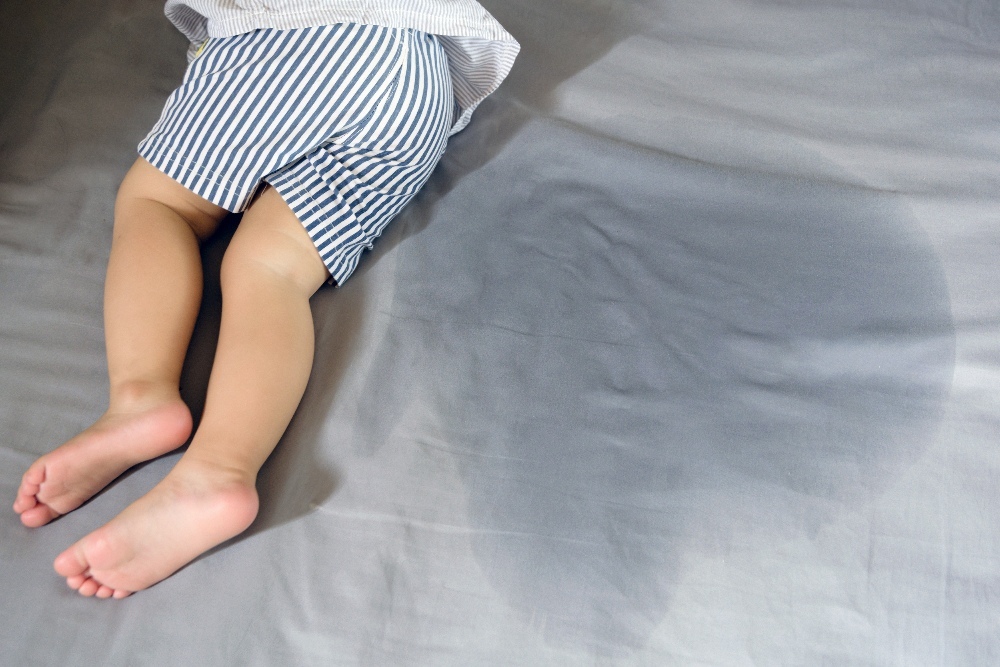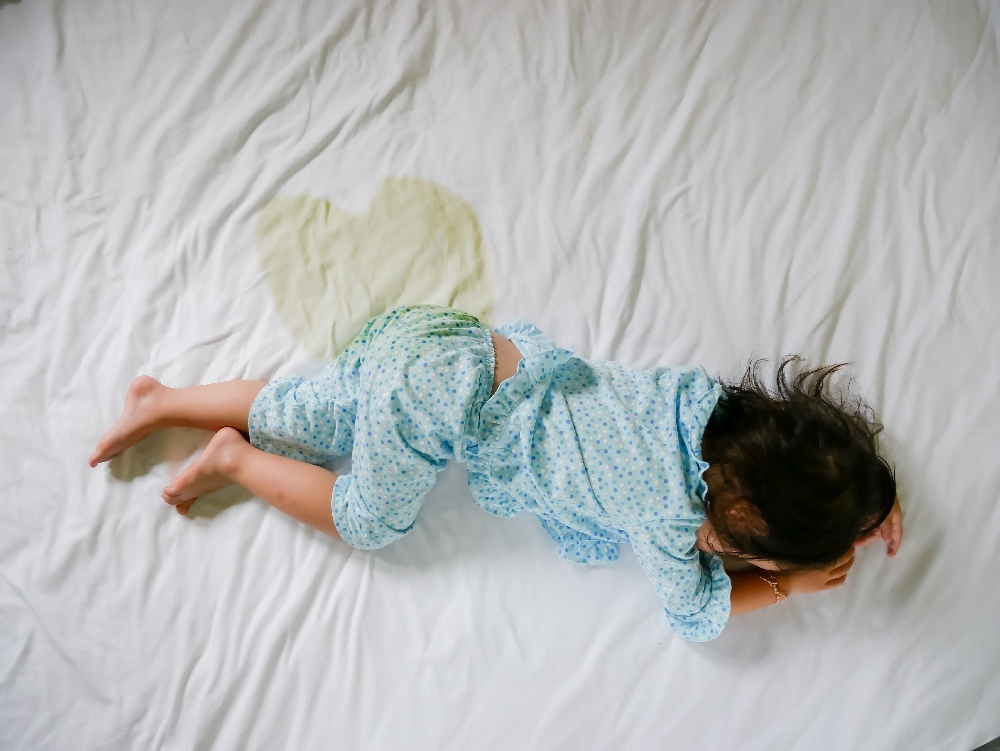Bedwetting, in its literal sense, is the loss of control of the bladder while sleeping, causing the bed to get wet. Usually, bedwetting is entirely normal, for children and is expected. But sometimes, it can be a sign of something problematic. Many parents are extremely skeptical and confused as to what could be the cause behind their kid wetting the bed. Here is all you need to know about bedwetting in children.

Causes Of Bedwetting:
Many children can control their bladder during the day by the age of 2-4 years. This is usually when they have completed their toilet training, but they are not able to do the same at night. But it might be an indication of some underlying disease or illness if your child doesn’t outgrow bedwetting. Here are some of the reasons this could be happening:
1) Your kid may have a smaller bladder.
2) Your child is constipated, which pushes the bladder and they feel the urge to urinate.
3) Your child is a deep sleeper and doesn’t awaken to the signal of a full bladder.
4) Your child produces more urine at night.
5) There is a family history of bedwetting.
6) Your child is stressed,s overly tired, or is going through a minor illness.
At What Age Is Bedwetting A Problem?
Most children outgrow bedwetting on their own with time. Statistics from a study state that:
- At five years of age, 15% of children wet the bed.
- By eight years of age, 6% to 8% of children wet the bed.
- Without treatment, about 2% of children still wet the bed by 15 years of age.
Many children wet their beds during toilet training. Even after staying dry for some days or weeks, they may start wetting at night again. If this happens, put them in their training pants at night for a while until ready to try again. The problem usually disappears as your child gets older.
Keep the following tips in mind while dealing with bedwetting:
- Be transparent with your child and let him or her know that it is not their fault, and they will eventually get through with this phase.
- Be sensitive and understanding of your child’s feelings. If you remain calm and composed about your kid wetting the bed, chances are your kid won’t stress over it too.
- Protect the bed and put a plastic cover under the sheets to prevent the mattress from smelling like urine.
- Encourage your child to help with you changing the sheets. This will inculcate responsibility. If your child takes this as a punishment, you should not force them. This behavior should not be punished.
- Refrain them from drinking liquids before bedtime and have them use the toilet multiple times before sleeping.
- Try to wake them up after 1-2 hours of sleep to help them stay dry during the night.
- If your child is not able to stay dry even after using these steps for one to three months, try using a bedwetting alarm. When a bedwetting alarm senses urine, the alarm goes off and helps teach your little one to wake up when the bladder is full. It’s a good idea to talk to the pediatrician before you decide to buy one as they can advise on how to use the alarm properly. Parents should use the alarm daily over a six-week to 3 month period to be effective.
Bedwetting usually doesn’t need to be treated. However, it is important to know if it is affecting your child or not. Most children usually outgrow it with time, but if it’s not upsetting your little one, you don’t need to seek bedwetting treatment. However, by 8-10 years, your kid’s self-esteem may start getting affected. It could interfere with social activities like sleepovers. This is when you need to seek a way to stop it.
Potential Medical Problems
Sometimes, your child may get thorough toilet training for six months, with no problems. All of a sudden, they start bedwetting. This could be an indication of an underlying medical problem, and you should speak to the pediatrician.
Most medical problems associated with bedwetting could have other signs, which include:
- Sudden change in mood or personality.
- Poor bowel control.
- Daytime and nighttime wetting.
- Urinating after stress.
- Pain or burning during urination.
- Cloudy or pink urine or bloodstains on underpants.
If your little one has any of these symptoms, make sure you check with the pediatrician about your child’s kidneys or bladder. The earlier you find the root of the problem, the sooner your child can be treated.
Conclusion
If nothing seems to be working, don’t stress yourself out. The good news is that as your kid’s body matures, bedwetting decreases. Only 1 in 100 adults have a problem with bedwetting. Until your child outgrows bedwetting, they will need emotional support from their parents and family. Support from a mental health professional can also help. Bed-wetting that starts in adulthood (secondary enuresis) is not normal and requires serious medical evaluation.
If you’re looking for help with being a more hands-on parent for your baby, ensure you download the ImmunifyMe app. It can help you with nutrition monitoring, immunization records, booking medical appointments and more.
FAQs On Bedwetting
What Is The Main Cause Of Bedwetting?
There isn’t one specific cause attributed to bedwetting. Instead, it could be a trigger reaction to other situations. A child who is feeling stressed out may start bedwetting. There could also be a genetic or family history of bedwetters that causes this problem.
Is Wetting The Bed A Psychological Problem?
In some cases, bedwetting can be traced back to something psychological. At the most, it could be a result of stress or anxiety. However, excessive bedwetting combined with other odd behavior could be a sign of a problem.
How Can I Stop Bedwetting?
Your child will outgrow bedwetting on their own, but there are steps you can take to help them. These include reducing their fluid intake before bed, and encouraging them to use the bathroom often before bed. Bedwetting in adults is not normal and requires medical attention.
What Age Should Bedwetting Stop?
Most kids should stop bedwetting by the age of 5 or 6.






